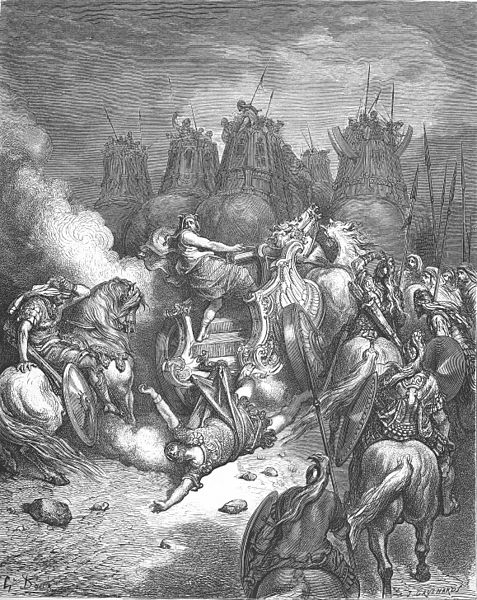Antiochus IV Epiphanes was a Greek Hellenistic king who ruled the Seleucid Empire from 175 BC until his death in 164 BC. He was a son of King Antiochus III the Great. Originally named Mithradates, he assumed the name Antiochus after he ascended the throne. Notable events during Antiochus's reign include his near-conquest of Ptolemaic Egypt, his persecution of the Jews of Judea and Samaria, and the rebellion of the Jewish Maccabees.
Bust of Antiochus IV at the Altes Museum in Berlin.
Sidon coinage of Antiochos IV, depicting a victorious galley.
Coin depicting Antiochus IV adorned with a radiate crown, Greek inscription reads ΘΕΟΥ ΕΠΙΦΑΝΟΥΣ ΝΙΚΗΦΟΡΟΥ / ΒΑΣΙΛΕΩΣ ΑΝΤΙΟΧΟΥ (King Antiochus, God manifest, bearer of victory)
Punishment of Antiochus, engraving by Gustave Doré
The Seleucid Empire was a Greek power in West Asia during the Hellenistic period. It was founded in 312 BC by the Macedonian general Seleucus I Nicator, following the division of the Macedonian Empire founded by Alexander the Great, and ruled by the Seleucid dynasty until its annexation by the Roman Republic under Pompey in 63 BC.
Seleucid Empire
"Chandra Gupta Maurya entertains his bride from Babylon": a conjectural interpretation of the "marriage agreement" between the Seleucids and Chandragupta Maurya, related by Appian
Coin of Seleucus I Nicator
In Bactria, the satrap Diodotus asserted independence to form the Greco-Bactrian kingdom c. 245 BC.








